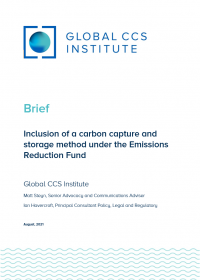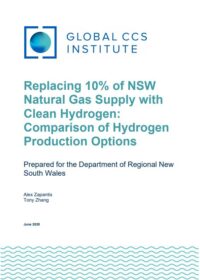Resources
Publications
Our publications, reports and research library hosts over 500 specialist reports and research papers on all topics associated with CCS.
View our Publication Library Disclaimer.
Filter by
Inclusion of a CCS Method Under the Emissions Reduction Fund
12th August 2021
Topic(s): Australia, CCS policy
The Emissions Reduction Fund (ERF) is the carbon crediting scheme in Australia through which the Federal Government purchases lowest cost carbon abatement from a range of sources. The fund looks to provide a market-based mechanism that encourages the pursuit of general emissions reductions within the broader context of climate mitigation.
In 2020 the Australian Government’s Low Emissions Technology Statement identified carbon capture and storage (CCS) as one of several priority low emissions technologies. At the request of the government and against the backdrop of emerging projects, the Clean Energy Regulatory began developing a CCS method (or methodology) under the Emissions Reduction Fund. Inclusion under the ERF would allow CCS projects to generate Australian Carbon Credit Units (ACCUs) and thereby generate income.
This brief from Senior Advocacy and Communications Adviser, Matt Steyn, and Principal Consultant Policy, Legal and Regulatory, Ian Havercroft, explains what the Emissions Reduction Fund is, examines how it works and explores the the inclusion of CCS as a methodology.
Disclaimer
The content within the Global CCS Institute Publications, Reports and Research Library is provided for information purposes only. We make every effort and take reasonable care to keep the content of this section up-to-date and error-free. However, we make no claim as to its accuracy, currency or reliability.
Content and material featured within this section of our website includes reports and research published by third parties. The content and material may include opinions and recommendations of third parties that do not reflect those held by the Global CCS Institute.
Replacing 10% of NSW Natural Gas Supply with Clean Hydrogen: Comparison of Hydrogen Production Options
17th November 2020
Organisation(s): Global CCS Institute
Topic(s): Australia, Carbon capture and storage (CCS), Hydrogen
Clean hydrogen is produced by either using renewable energy to produce green hydrogen, or by using fossil fuels with carbon capture and storage (CCS) to create blue hydrogen.
As part of determining the most cost-effective method of creating clean hydrogen, Coal Innovation NSW (CINSW) commissioned the Global CCS Institute to investigate the production costs of replacing 10 per cent of NSW’s natural gas supply with clean hydrogen.
The study considers a scenario where sufficient clean hydrogen is produced to achieve a 10% H2:90% CH4 (natural gas) mix by volume in the NSW gas network and supply the same total energy as is currently supplied by natural gas alone. Options considered were reformation of natural gas with carbon capture and storage (CCS), coal gasification with CCS, and electrolysis of water using renewable electricity. The study found that the best option for the production of clean hydrogen in NSW considering cost, scale, resource use, and emissions abatement outcomes is to utilise coal or gas with CCS.
See NSW Government for further information
Disclaimer
The content within the Global CCS Institute Publications, Reports and Research Library is provided for information purposes only. We make every effort and take reasonable care to keep the content of this section up-to-date and error-free. However, we make no claim as to its accuracy, currency or reliability.
Content and material featured within this section of our website includes reports and research published by third parties. The content and material may include opinions and recommendations of third parties that do not reflect those held by the Global CCS Institute.

